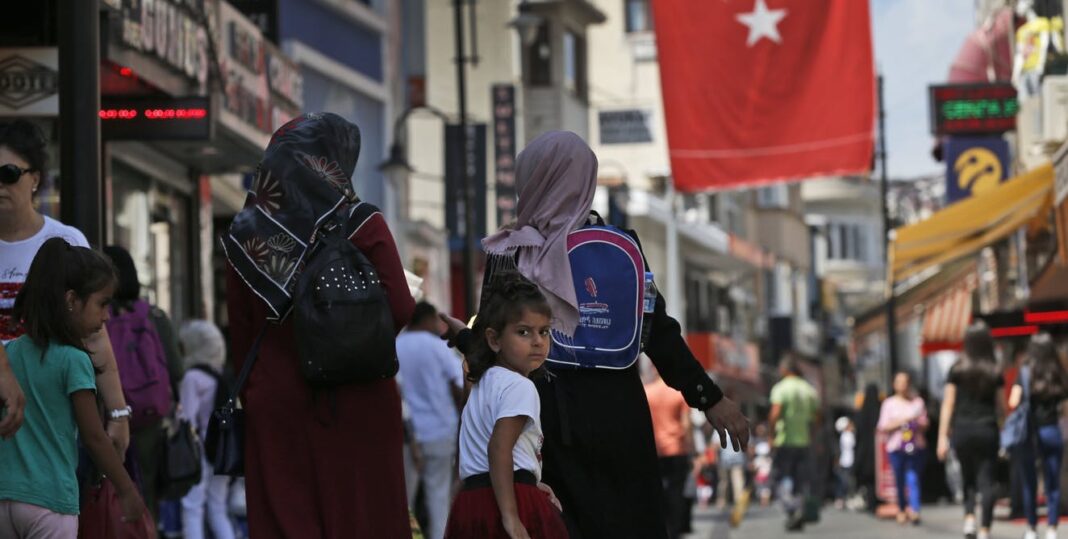« Turkey’s president has stepped up economic pledges to the electorate ahead of next year’s polls, which loom as the toughest test of his two-decade rule » reports Mustafa Sonmez in Al-Monitor.
Wary of his sagging popular support and economic turmoil ahead of elections next year, Turkish President Recep Tayyip Erdogan appears ready to shower “election candies” on various segments of voters at the risk of wrecking public finances.
Turkey’s next presidential and parliamentary polls — in June 2023 at the latest — are looming as the toughest challenge yet to Erdogan and his Justice and Development Party, in power since November 2002, as popular grievances grow, fueled by an inflation topping 80% and its many social ramifications.
In a pledge likely to become a centerpiece in his re-election campaign, Erdogan announced on Sept. 13 that the state-run housing agency TOKI would build half a million new homes for low-income families over five years, including 250,000 homes in the initial two-year phase. The investment value of the plan, involving also the construction of business offices, is about 900 billion Turkish liras ($49 billion), he said.
In a country where 42.5% of families are not homeowners, housing has grown into a grave problem for low-income groups amid a massive increase in prices and rents in the past couple of years. Erdogan’s housing project, based on subsidized prices and payments extended over 20 years, attracted about 3.5 million applications in less than a week, according to officials. Buoyed by the demand, Ankara is now considering a similar project for middle-income groups.
Erdogan put the price of a two-bedroom apartment at 608,000 liras (about $33,000), including a 10% down payment and 240 monthly installments of 2,280 liras ($123) – less than half of the minimum wage, which is the pay of nearly half of employees in the country. Subsequently, however, TOKI clarified it would raise the monthly payments twice a year, taking into account public-sector pay rises in the preceding six months. This means the installments would be more or less indexed to inflation and the cost of the apartments is likely to grow.
In another election-oriented move, prompted by the advent of winter and popular anger over gas and electricity hikes, Erdogan at the weekend offered tax incentives to businesses that help cover employees’ energy bills until April. Such payments of up to 1,000 liras ($54) will be exempted from income tax and social security premiums, he said.
Ankara is working also on a scheme of early retirement, long sought by several million people who have lost their eligibility to retire at an earlier age due to new criteria introduced retrospectively in 1999.
In December, the minimum wage and the pays of public employees and pensioners will be hiked. Expectation is building also for a fiscal pardon on tax debts and an amnesty on illicit construction.
To what extent such populist steps could sway the electorate is hard to say, but they will clearly bring the budget deficit to more than the 6.4% of gross domestic product that the government targets in its medium-term economic program.
Erdogan is expected to make use of the lower inflation rates that Turkey is projected to begin to register in December, thanks to a lower base last year. The Central Bank is likely to continue cutting its policy rate to as low as 9% in the coming months. The rate was reduced by 100 basis points to 11% last week — the latest in a series of cuts despite rampant inflation. The bank has delivered the cuts at the behest of Erdogan, who holds the unconventional economic view that high interest rates fuel price increases.
With the conjunction of new rate cuts and lower inflation rates, Ankara might well try to create the perception that it has managed to rein in inflation by lowering interest rates. “God willing, we’ll bring inflation down to reasonable levels from February onwards and we are determined to reduce it to single-digit figures in the coming years,” Erdogan said in an address to business people on Sept. 25.
Bent on promoting economic growth with rate cuts, he urged the business community to invest. “I’m inviting you to invest [by making use of] low interest rates, primarily by public banks. The investments you’ll make by taking loans with low interest rates will create jobs, sustain production, boost exports and turn the current account to our favor,” he said.
Turkey’s economy, however, is heavily reliant on imports, and growth will inevitably increase its current account deficit, which stood at $36.5 billion in July and is expected to exceed $50 billion at the year-end. Moreover, the country faces foreign debt liabilities of $180 billion over the next 12 months. Those are factors that keep the lira under pressure, as evidenced by the currency’s slump to new lows versus the dollar this week.
In a bid to curb the rush for hard currency, Ankara has encouraged depositors to keep 1.3 trillion liras ($70.2 billion) in a deposit scheme, in which the Treasury and the Central Bank compensate them for losses incurred from the depreciation of the currency. A big increase in foreign-currency inflows of unknown origin and other inflows secured through political contacts with Russia and Gulf countries have also helped to slow the increase in foreign-currency prices to some extent. Yet, such benefits from cooperation with Russia, in particular, appear hardly sustainable due to the specter of Western sanctions.
In sum, Erdogan appears bent on lavish economic gestures to voters at the expense of opening big holes in public finances and foisting hefty bills on state banks, other public economic entities and the next government.
Al-Monitor, September 28, 2022, Mustafa Sonmez

